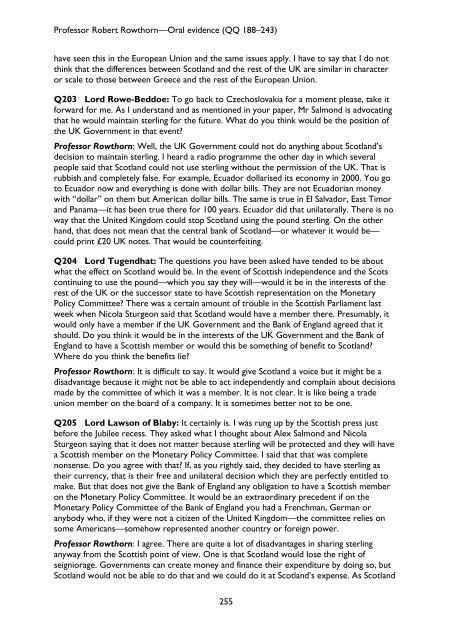SELECT COMMITTEE ON ECONOMIC AFFAIRS - Parliament
SELECT COMMITTEE ON ECONOMIC AFFAIRS - Parliament
SELECT COMMITTEE ON ECONOMIC AFFAIRS - Parliament
You also want an ePaper? Increase the reach of your titles
YUMPU automatically turns print PDFs into web optimized ePapers that Google loves.
Professor Robert Rowthorn—Oral evidence (QQ 188–243)<br />
have seen this in the European Union and the same issues apply. I have to say that I do not<br />
think that the differences between Scotland and the rest of the UK are similar in character<br />
or scale to those between Greece and the rest of the European Union.<br />
Q203 Lord Rowe-Beddoe: To go back to Czechoslovakia for a moment please, take it<br />
forward for me. As I understand and as mentioned in your paper, Mr Salmond is advocating<br />
that he would maintain sterling for the future. What do you think would be the position of<br />
the UK Government in that event?<br />
Professor Rowthorn: Well, the UK Government could not do anything about Scotland’s<br />
decision to maintain sterling. I heard a radio programme the other day in which several<br />
people said that Scotland could not use sterling without the permission of the UK. That is<br />
rubbish and completely false. For example, Ecuador dollarised its economy in 2000. You go<br />
to Ecuador now and everything is done with dollar bills. They are not Ecuadorian money<br />
with “dollar” on them but American dollar bills. The same is true in El Salvador, East Timor<br />
and Panama—it has been true there for 100 years. Ecuador did that unilaterally. There is no<br />
way that the United Kingdom could stop Scotland using the pound sterling. On the other<br />
hand, that does not mean that the central bank of Scotland—or whatever it would be—<br />
could print £20 UK notes. That would be counterfeiting.<br />
Q204 Lord Tugendhat: The questions you have been asked have tended to be about<br />
what the effect on Scotland would be. In the event of Scottish independence and the Scots<br />
continuing to use the pound—which you say they will—would it be in the interests of the<br />
rest of the UK or the successor state to have Scottish representation on the Monetary<br />
Policy Committee? There was a certain amount of trouble in the Scottish <strong>Parliament</strong> last<br />
week when Nicola Sturgeon said that Scotland would have a member there. Presumably, it<br />
would only have a member if the UK Government and the Bank of England agreed that it<br />
should. Do you think it would be in the interests of the UK Government and the Bank of<br />
England to have a Scottish member or would this be something of benefit to Scotland?<br />
Where do you think the benefits lie?<br />
Professor Rowthorn: It is difficult to say. It would give Scotland a voice but it might be a<br />
disadvantage because it might not be able to act independently and complain about decisions<br />
made by the committee of which it was a member. It is not clear. It is like being a trade<br />
union member on the board of a company. It is sometimes better not to be one.<br />
Q205 Lord Lawson of Blaby: It certainly is. I was rung up by the Scottish press just<br />
before the Jubilee recess. They asked what I thought about Alex Salmond and Nicola<br />
Sturgeon saying that it does not matter because sterling will be protected and they will have<br />
a Scottish member on the Monetary Policy Committee. I said that that was complete<br />
nonsense. Do you agree with that? If, as you rightly said, they decided to have sterling as<br />
their currency, that is their free and unilateral decision which they are perfectly entitled to<br />
make. But that does not give the Bank of England any obligation to have a Scottish member<br />
on the Monetary Policy Committee. It would be an extraordinary precedent if on the<br />
Monetary Policy Committee of the Bank of England you had a Frenchman, German or<br />
anybody who, if they were not a citizen of the United Kingdom—the committee relies on<br />
some Americans—somehow represented another country or foreign power.<br />
Professor Rowthorn: I agree. There are quite a lot of disadvantages in sharing sterling<br />
anyway from the Scottish point of view. One is that Scotland would lose the right of<br />
seigniorage. Governments can create money and finance their expenditure by doing so, but<br />
Scotland would not be able to do that and we could do it at Scotland’s expense. As Scotland<br />
255

















